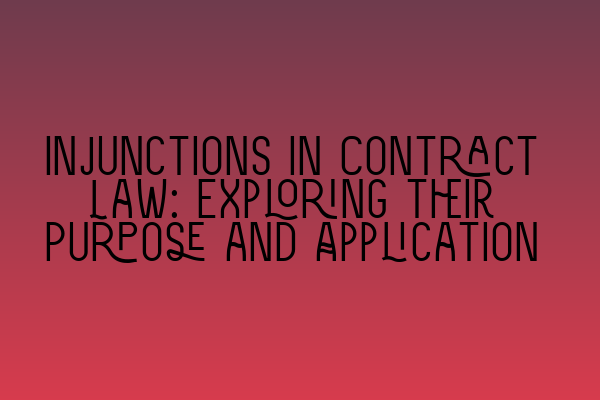Injunctions in Contract Law: Exploring their Purpose and Application
In the realm of contract law, injunctions play a crucial role in ensuring that parties fulfill their contractual obligations. An injunction is a legal remedy sought by a party to a contract to prevent the other party from committing a specific act or to compel them to perform a particular obligation. It is a powerful tool that courts can utilize to maintain fairness and protect the rights of both parties involved.
The purpose of an injunction in contract law is to maintain the status quo and prevent any harm or irreparable damage that may arise from a breach of contract. It is designed to provide immediate relief and halt any further violations, ultimately protecting the interests of the innocent party.
There are two main types of injunctions commonly used in contract law: the prohibitory injunction and the mandatory injunction. Let’s delve deeper into each of these types to understand their purpose and application.
1. Prohibitory Injunction:
A prohibitory injunction, as the name suggests, restricts or prohibits a party from carrying out a specific action. It aims to prevent further breaches of the contract or the infringement of the innocent party’s rights. For example, if Party A has agreed not to disclose valuable trade secrets to any third party, and there is evidence that Party A is about to do so, Party B can seek a prohibitory injunction to prevent this action from occurring.
The purpose of a prohibitory injunction is to maintain the contractual relationship and protect the interests of the innocent party. It serves as a deterrent to ensure that the breaching party complies with their obligations, and it also provides the innocent party with a sense of security and assurance that their rights are being safeguarded.
2. Mandatory Injunction:
Unlike a prohibitory injunction, which seeks to stop an action, a mandatory injunction requires a party to perform a specific act. It compels the party in breach to fulfill their contractual obligations. For example, if Party A has agreed to deliver certain goods to Party B by a specified date and fails to do so, Party B can seek a mandatory injunction to compel Party A’s performance.
The purpose of a mandatory injunction is to rectify any breaches and restore the innocent party to the position they would have been in had the contract been performed correctly. It aims to ensure that the innocent party receives the benefit of their bargain and is not left to suffer any losses or damages due to the breaching party’s negligence or non-compliance.
When seeking an injunction in contract law, there are a few key considerations to keep in mind. Firstly, the party seeking the injunction must demonstrate that there is a serious question to be tried, i.e., there is a valid and enforceable contract in place. Secondly, they must show that there is a real risk of irreparable harm or damage if the injunction is not granted. Finally, they must prove that the “balance of convenience” favors granting the injunction, meaning that the overall interests of justice would be best served by providing the relief sought.
In conclusion, injunctions play a vital role in contract law by ensuring that parties fulfill their contractual obligations and rights. Whether it is to prevent further breaches or compel performance, injunctions provide a swift and effective remedy to protect the interests of the innocent party. By understanding the purpose and application of injunctions in contract law, individuals and businesses can better navigate the complexities of their contractual relationships and seek proper recourse when necessary.
If you are preparing for the SQE (Solicitors Qualifying Exam), it’s important to have a firm grasp of topics related to contract law, including injunctions. For additional practice and preparation resources for the SQE exams, check out our related articles:
– SQE 1 Practice Exam Questions
– SQE 1 Practice Mocks FLK1 FLK2
– SQE 2 Preparation Courses
– SQE 1 Preparation Courses
– SRA SQE Exam Dates
These resources will provide you with invaluable insights and help you ace your exams. Whether you are a law student, a practicing solicitor, or someone interested in contract law, continuous learning and preparation are key to success in this ever-evolving field.
